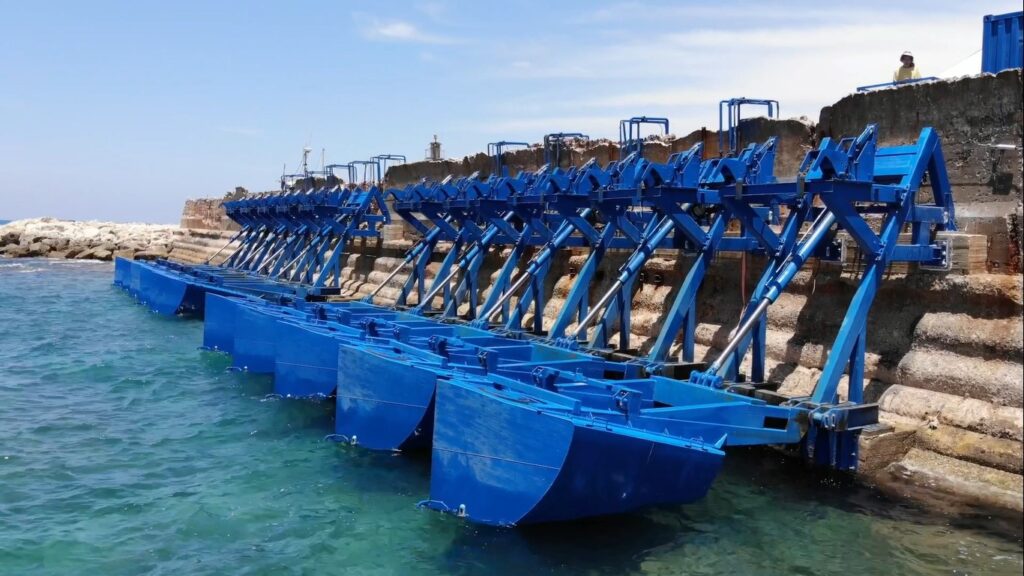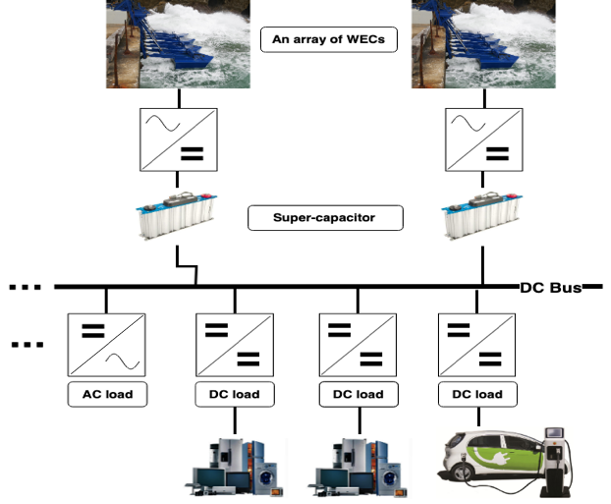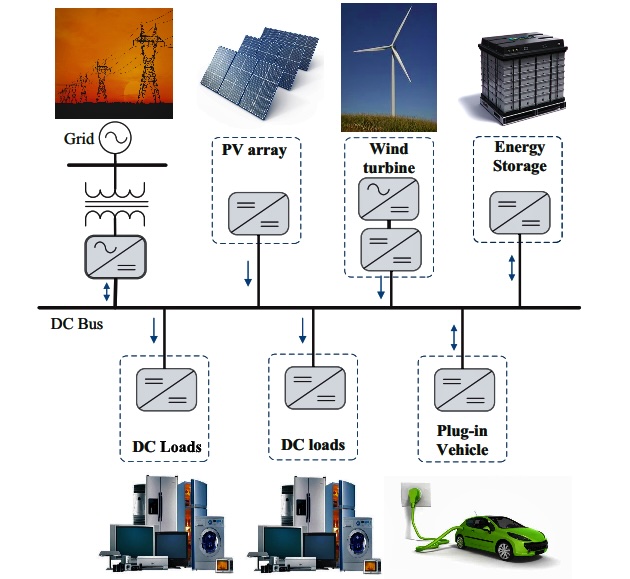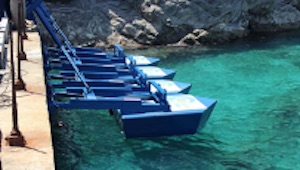
Project: Islanded Wave Powered Microgrid Pilotfor Remote Islands in Thailand
Funding: Innovate UK (Energy Catalyst R10), Project funding: £1,499,644
Collaborators:
Aquatera Limited
Toshiba Europe Limited
University of Manchester
University of Exeter
Queen Mary University of London
EcoWavePower
Leonics Ltd
AIT, Thailand (sub-contractor)
Curiosity Technology Ltd (sub-contractor)
M4 Wave Power Ltd (sub-contractor)
News: Microgrid Knowledge
This mid-stage project is an extension of our Energy Catalyst R8 early-stage project, “Sea wave energy powered microgrid for remote islands and rural areas”, showing promising results and the feasibility of the proposed concepts. Firstly, the unit cost of the electricity generated by onshore wave-powered microgrids(WPMGs) can be significantly reduced due to two novel technologies: a) the advanced predictive optimal control can improve the wave power output of the onshore wave energy converter (WECs) by 50% to several times in a range of sea states. b) Using stochastic deep-learning-based prediction algorithms, the novel microgrid power management of the state-of-the-art power electronics hardware components can significantly reduce the power conversion and distribution loss in varying weather conditions. Moreover, the microgrid provides a reliable and secure source of electricity using wireless, distributed, consensus-based, and remote energy management systems. Secondly, the initial social and economic studies of the representative areas in Thailand showed the feasibility of applying the proposed concept. In this mid-stage project, we aim to advance this promising concept significantly by systematically demonstrating the efficacies of the whole concept to pave the way for sea-trial testing validation at the final stage. This will be achieved by further developing the key technologies to higher TRL levels in more realistic conditions and integrating all the key components into one hybridsystem-level hardware simulator to validate the functionalities of the microgrid efficiently and economically in various scenarios close to real sea conditions. The latest Radar-based Deterministic Sea Wave Prediction (R-DSWP) technology will be developed for onshore wave energy applications for the first time to providewave prediction for the predictive control algorithms and trigger the shutdown ofthe microgrid for detrimental waves to increase survivability. A new fully controllable Power take-off (PTO) system enabling bi-directional power flow, as requested by the advanced WEC control algorithms, will be developed and tested.The high-fidelity WEC hydrodynamic models will be developed. Based on this newPTO and the high-fidelity WEC models, the whole WEC control system will bedesigned to improve the energy conversion efficiency further and enhance the robustness and survivability of the WEC system. Overall, the project aims to provide inclusive community-based renewable energy (sensitive to gender equality and social inclusiveness) that addresses the lack of energy access in Thailand’s remote and isolated islands and eventually in other SE Asia countries like thePhilippines and Indonesia.

Project: Sea Wave Energy Powered Microgrid for Remote Islands and Rural Coasts
Funding: Innovate UK (Energy Catalyst R8), Project funding: £300,000
Collaborators:
EcoWavePower
Queen Mary University of London
Asian Institute of Technology (AIT)
News: News feed
Wave energy is less intermittent and has denser energy than solar or wind energy. Wave energy technology is, however, at its infancy and has not been commercialised at large scale due to the high Levelized cost of energy (LCOE) caused by the maintenance, long-distance power transmission and low conversion efficiency of the offshore WECs. Instead of addressing wave energy issues at farm level, this project aims to develop a resilient and highly efficient on-shore wave-powered microgrid. The project’s technology will provide electricity for the local residents in rural coastal areas and remote islands in Thailand. Other South(east) Asian countries with limited or no access to grid, but with easy access to waves, can also benefit from the project.
In particular, we will work on the wave energy converters (WECs) developed by EcoWavePower Ltd (EWP) which has been operating the only grid-connected wave energy floaters array in the world, operational in accordance with a Power Purchase Agreement (PPA) since 2016 in Gibraltar. The WECs of EWP have many competitive advantages regarding cost-efficiency, insurability, reliability and environmental friendliness, as it does not create a new presence on the ocean floor. The consortia will develop novel control systems and power electronics for onshore WECs to significantly improve their overall performance and reduce the LCOE to that of solar. In our solution, the maintenance cost is minimal due to autonomous control, easy access, and remote monitoring functionality. Moreover, the wave power station does not require too much space for building up in the limited land area in islands and does not need long-distance power transmission since the wave-powered microgrid will be based close to the local community and designed based on their particular needs. The wave-powered microgrid is easily scalable and as a case study it will be developed with affordable capital investment backed by the local Thai government and existing public-private partnership in Thailand.

Project: Distributed and networked Control of Microgrids/Nanogrids
Funding: EPSRC GCRF Sponsorship, EP/R512709/1, Project value: £100,000
Collaborators:
Prof. Weerakorn Ongsakul | AIT, Thailand
Prof. Jing Na | KUST, Kunming, China
Prof. Saiful Huque | University of Dhaka, Bangladesh
Dr Nasif Shams | University of Dhaka, Bangladesh
SolarLand USA
Microgrids (MGs) and nano-grids (NGs) are becoming an essential part of the clean power generation to exploit solar, wind, and wave renewable resources with energy storages to store the intermittent power and provide high-quality power for a small community. MGs can enhance the power factor (especially when grid-connected), energy security, remote energy management, and lower the maintenance. However, their control and energy management is levelised and complex and demands specific design considerations. We focus our research on developing islanded (independent) MG control and communication system, where we enhance MG modelling, stability analysis, and secondary-level control system. We use event-triggered, decentralised models for WSN-based MG with flexible architectures, reduced network traffic, and increased the sensor battery life-time.
The MG models include generators, energy storage systems, loads, power electronics converters. The models describe the MG in local control levels such as power converter, connection level such as wireless sensor network (WSN), and global control level such as MG controller. In implementing local, distributed, and hierarchical controllers, we integrate networked control strategies to provide fast communication, balance the energy level between energy storage and generation, and handle different frequency ranges, and time scales of different MG elements. To achieve MG stability in complex network scenarios like communication topology change, we develop novel controllability and observability tools. To provide the best power quality, we suppress the voltage and current harmonics and unbalanced, and reduce over- and under-voltage problems caused by increasing DGs and EVs in the MG network.

Project: Hybrid (solar, wave) Powered Micro-grid for Remote Areas using Second- Life Li-ion Batteries (LiBs)
Funding: UKRI GCRF Large Grant Scheme, Project value: £20,000
Collaborators:
EcoWavePower
Dr Guang Li | QMUL
Prof. Weerakorn Ongsakul | AIT, Thailand
Wave energy alone can almost provide the total planet electricity consumption ~2.11 TW and 50% of the world’s population lives within 60 km of the sea. Unlike fossil fuels, wave energy is clean, and causes no air and noise pollution, and is always available with denser energy resource compared to wind and solar. With wave energy converters (WECs), the energy contained in the sea waves is captured. However, wave energy technology is still at its infancy.
It has not been commercialised at large scale due to the unit cost caused by the maintenance, long-distance transmission and low conversion efficiency. Rather than focus on large scale wave energy farm to connect with the national grid, this project aims to develop a resilient and highly-efficient standalone microgrid (with an array of WECs) to make the wave energy economically viable with minimum maintenance and autonomous power management. To reduce the power loss and Levelised cost of energy close to solar/wind, we improve the WEC conversion efficiency using model predictive control approaches and SiC-based power electronic converters.
Selected Papers:
Distributed Event-Triggered Control for DC Microgrids over Industrial Wireless Sensor Networks
Download PDF
Forecast-Based Consensus Control for DC Microgrids Using Distributed LSTM Deep Learning Models
Download PDF
Multilayer event-based Distributed Control System for DC microgrids with non-uniform delays
Download PDF
Optimal Observer Synthesis for Microgrids with Adaptive Send-on-Delta Sampling over IoT networks
Download PDF